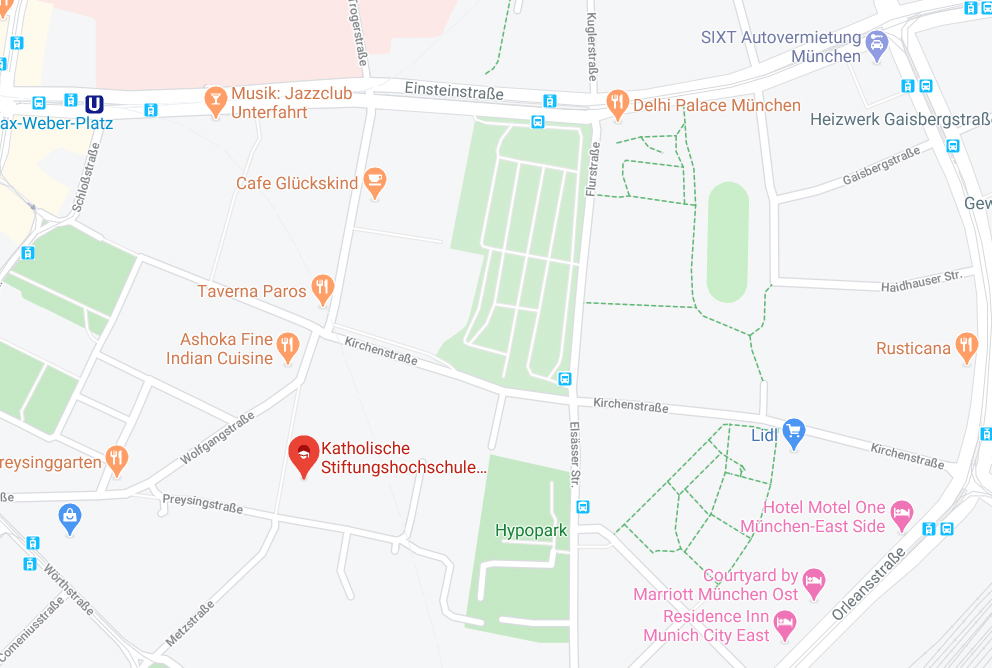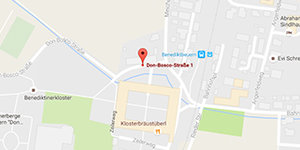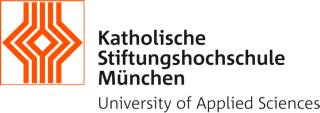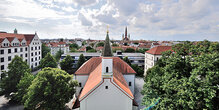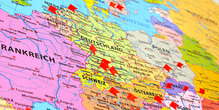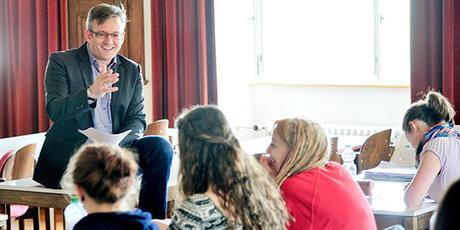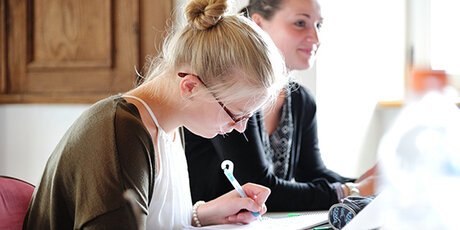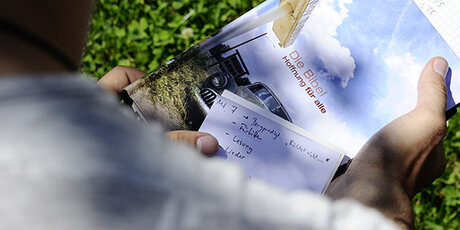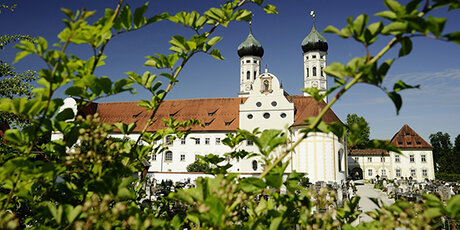Social Work (B.A.) Benediktbeuern
Study location
Benediktbeuern
Faculty
Social Work, Benediktbeuern
Dean of the Faculty
Prof. Dr. Fritz Böckh
Academic degree
Bachelor of Arts (B.A.)
Start of the degree programme
winter semester
Standard period of study
7 semesters (including 1 practical semester)
Application period
online 02.05. - 20.08.
The degree programme
The scientific and practice-oriented degree programme in Social Work leading to a Bachelor of Arts (B. A.) degree conveys profound professional knowledge, key skills and differentiated action methods for various fields of activity within social work.
An additional qualification in theology (TZ) is offered in parallel to the degree programme. On top of this, there is also the opportunity to gain an additional qualification in experiential pedagogy (EPZ) or music pedagogy (MUZA).
Prospects & perspectives
As a graduate of the Bachelor’s degree programme in Social Work, you have numerous opportunities in the professional fields of social work with different target groups and a diverse range of tasks. For example, your work could range from outpatient and residential child welfare and youth services, to the growing areas of public health and assistance for the elderly, right through to consulting and educational work with a range of target groups.
In the course of your studies, you can choose different focal points through the practical seminar and the various areas of specialisation. The degree generally entitles graduates to admission to a Master's degree programme under certain prerequisites. Graduates of the degree programme in Social Work (B.A.) at our university find interesting jobs in a range of fields within social work, such as:
- Child and youth welfare
- Social services, social planning
- Social work with women and girls
- Education, cultural education
- Advising and supporting families
- Social gerontology
- Social work within the context of migration and integration
- Social work with disabled people
- Addiction counselling, socio-psychiatric services
- Health promotion
- Adult education
- Care for those at risk and social rehabilitation
- Social services at schools, adolescent social work
Objectives & contents
The Bachelor’s degree programme in Social Work aims to qualify students to act professionally in the activities involved in this field, through practice-oriented teaching on a scientific basis. The Bachelor of Arts degree is the first professional qualification in the study of social work. The degree programme is oriented towards the Christian image of the world and the people, and offers you the opportunity to integrate your professional actions into a well-founded system of values.
Graduates of the degree programme possess:
- scientifically based knowledge of the discipline of social work
- differentiated methods and approaches to social work
- a differentiated overview of the various occupational fields of social work
- a sound knowledge of social work's related disciplines such as psychology, health sciences and medicine, sociology, ethics, law, educational science, politics
- the ability to reflect on the ethical aspects of social work
- essential key qualifications such as rhetoric and moderation
- the internationally recognised Bachelor of Arts (B.A.) qualification
Course contents
The degree programme in social work is divided into the following sections:
1. The science of social work
- The development of social work as a profession and a discipline
- Scientific and social work theories
- Social work in the national and international context
2. Related sciences of social work
- Sociology, educational science, psychology
- Ethics and law
- Health sciences and medicine
- Social and communal politics
3. Actions in practical social work
- Management theory of social work
- Organisational theory of social work
- Social management
- Culture, aesthetics, media
4. Compulsory elective section
5. Areas of specialisation
- Social work as reintegration
- Family support
- Social work in rehabilitation
- Intergenerational social work
- Social work with young people
- Social work in the context of environment, culture and media
- Migration and social work
6. Bachelor's thesis
Structure of the curriculum
The standard period of study consists of seven semesters in which 210 ECTS credit points are earned. One of these semesters is a practical semester. The degree programme is modular in design, i.e. the topical areas are split into modules.
The degree programme in social work is divided into the following segments:
Segment I: 1st - 3rd semester
Acquisition of basic knowledge of the science and methods of social work, as well as basic knowledge and skills from various related disciplines.
In the 3rd semester, the students are specifically prepared for different practical fields of social work in practical seminars and a three-week practical phase.
Segment II: 4th semester (practical semester)
The students complete a theory-led and application-related practical semester. This practice-oriented phase is instructed, supervised and evaluated by teachers from the KSH in practical seminars. It is aimed at the scientific investigation of the requirements in real life practice. Students also have the opportunity to receive practical advice.
Segment III: 5th – 7th semester
The students deepen their scientific knowledge and develop their professional competence. An individual focus takes place through freely selectable areas of specialisation. These are subject to the generalist orientation of the studies, and are not intended to enable technical specialisation, but rather exemplary deepening of knowledge.
The Bachelor's thesis, which may be topically related to the science-oriented practical phase and/or the in-depth modules, forms the conclusion of segment III. The degree programme ends with successful completion of all modules and the Bachelor's thesis. The Bachelor’s degree (B.A.) generally entitles graduates to admission to a Master's degree programme under certain prerequisites.
Applications & admission
All information regarding applications and admission can be found on the pages of the Benediktbeuern Student Secretary’s Office. If you have a foreign higher education entrance qualification or a foreign university degree, and wish to apply for a Bachelor's degree programme at the KSH Munich, you must first have your foreign certificates checked by the external service provider uni-assist e.V.. The pre-evaluation documentation obtained from uni-assist e.V. must be submitted together with the application documents. For more information, please see the section on Information for Foreign Applicants.
Contacts
For further information about the degree programme, please refer to the German pages about the Social Work (B.A.) course Benediktbeuern, or ask the general contact person at the Dean's Office.
Social Work (B.A.) Benediktbeuern
Study location
Benediktbeuern
Faculty
Social Work, Benediktbeuern
Dean of the Faculty
Prof. Dr. Fritz Böckh
Academic degree
Bachelor of Arts (B.A.)
Start of the degree programme
winter semester
Standard period of study
7 semesters (including 1 practical semester)
Application period
online 02.05. - 20.08.
The degree programme
The scientific and practice-oriented degree programme in Social Work leading to a Bachelor of Arts (B. A.) degree conveys profound professional knowledge, key skills and differentiated action methods for various fields of activity within social work.
An additional qualification in theology (TZ) is offered in parallel to the degree programme. On top of this, there is also the opportunity to gain an additional qualification in experiential pedagogy (EPZ) or music pedagogy (MUZA).
Prospects & perspectives
As a graduate of the Bachelor’s degree programme in Social Work, you have numerous opportunities in the professional fields of social work with different target groups and a diverse range of tasks. For example, your work could range from outpatient and residential child welfare and youth services, to the growing areas of public health and assistance for the elderly, right through to consulting and educational work with a range of target groups.
In the course of your studies, you can choose different focal points through the practical seminar and the various areas of specialisation. The degree generally entitles graduates to admission to a Master's degree programme under certain prerequisites. Graduates of the degree programme in Social Work (B.A.) at our university find interesting jobs in a range of fields within social work, such as:
- Child and youth welfare
- Social services, social planning
- Social work with women and girls
- Education, cultural education
- Advising and supporting families
- Social gerontology
- Social work within the context of migration and integration
- Social work with disabled people
- Addiction counselling, socio-psychiatric services
- Health promotion
- Adult education
- Care for those at risk and social rehabilitation
- Social services at schools, adolescent social work
Objectives & contents
The Bachelor’s degree programme in Social Work aims to qualify students to act professionally in the activities involved in this field, through practice-oriented teaching on a scientific basis. The Bachelor of Arts degree is the first professional qualification in the study of social work. The degree programme is oriented towards the Christian image of the world and the people, and offers you the opportunity to integrate your professional actions into a well-founded system of values.
Graduates of the degree programme possess:
- scientifically based knowledge of the discipline of social work
- differentiated methods and approaches to social work
- a differentiated overview of the various occupational fields of social work
- a sound knowledge of social work's related disciplines such as psychology, health sciences and medicine, sociology, ethics, law, educational science, politics
- the ability to reflect on the ethical aspects of social work
- essential key qualifications such as rhetoric and moderation
- the internationally recognised Bachelor of Arts (B.A.) qualification
Course contents
The degree programme in social work is divided into the following sections:
1. The science of social work
- The development of social work as a profession and a discipline
- Scientific and social work theories
- Social work in the national and international context
2. Related sciences of social work
- Sociology, educational science, psychology
- Ethics and law
- Health sciences and medicine
- Social and communal politics
3. Actions in practical social work
- Management theory of social work
- Organisational theory of social work
- Social management
- Culture, aesthetics, media
4. Compulsory elective section
5. Areas of specialisation
- Social work as reintegration
- Family support
- Social work in rehabilitation
- Intergenerational social work
- Social work with young people
- Social work in the context of environment, culture and media
- Migration and social work
6. Bachelor's thesis
Structure of the curriculum
The standard period of study consists of seven semesters in which 210 ECTS credit points are earned. One of these semesters is a practical semester. The degree programme is modular in design, i.e. the topical areas are split into modules.
The degree programme in social work is divided into the following segments:
Segment I: 1st - 3rd semester
Acquisition of basic knowledge of the science and methods of social work, as well as basic knowledge and skills from various related disciplines.
In the 3rd semester, the students are specifically prepared for different practical fields of social work in practical seminars and a three-week practical phase.
Segment II: 4th semester (practical semester)
The students complete a theory-led and application-related practical semester. This practice-oriented phase is instructed, supervised and evaluated by teachers from the KSH in practical seminars. It is aimed at the scientific investigation of the requirements in real life practice. Students also have the opportunity to receive practical advice.
Segment III: 5th – 7th semester
The students deepen their scientific knowledge and develop their professional competence. An individual focus takes place through freely selectable areas of specialisation. These are subject to the generalist orientation of the studies, and are not intended to enable technical specialisation, but rather exemplary deepening of knowledge.
The Bachelor's thesis, which may be topically related to the science-oriented practical phase and/or the in-depth modules, forms the conclusion of segment III. The degree programme ends with successful completion of all modules and the Bachelor's thesis. The Bachelor’s degree (B.A.) generally entitles graduates to admission to a Master's degree programme under certain prerequisites.
Applications & admission
All information regarding applications and admission can be found on the pages of the Benediktbeuern Student Secretary’s Office. If you have a foreign higher education entrance qualification or a foreign university degree, and wish to apply for a Bachelor's degree programme at the KSH Munich, you must first have your foreign certificates checked by the external service provider uni-assist e.V.. The pre-evaluation documentation obtained from uni-assist e.V. must be submitted together with the application documents. For more information, please see the section on Information for Foreign Applicants.
Contacts
For further information about the degree programme, please refer to the German pages about the Social Work (B.A.) course Benediktbeuern, or ask the general contact person at the Dean's Office.
